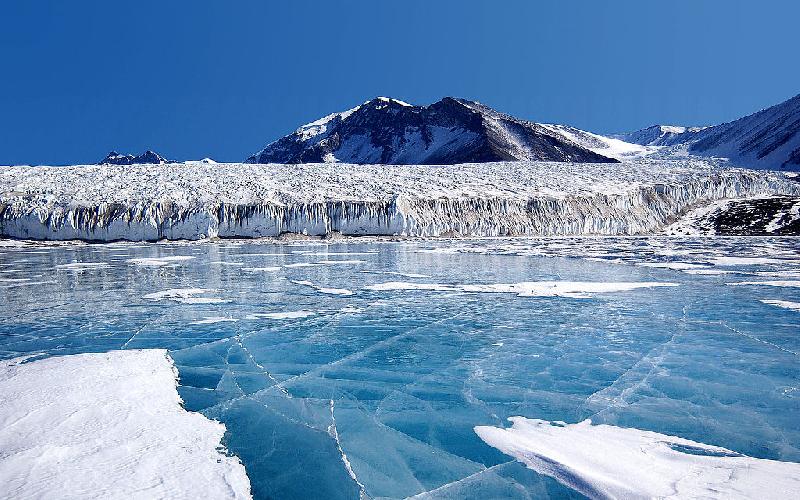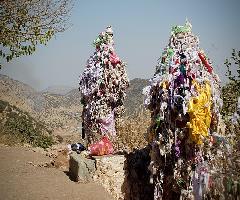The Ice Clad Continent
Antarctica, covered with a layer of rock hard ice, between one to three miles in thickness, is in more ways than one, the last unconquered frontier on this planet for the human race. A continent that is 1.3 times the size of Europe, and which holds about 70% of global fresh water in the form of ice is bound to carry enormous attraction for countries and people itching to explore, control and possess it.
No surprise then that this last frontier is testing today the combined wisdom of human civilization, caught between those who are anxious to develop
the continent for exploitation in whatever form possible, and those who are equally perturbed at the long term dangers imposed from the recklessness of such actions. Both the sides have many arguments to offer, and there seems to be at least some logic in both.Antarctica: The Present
So far, the continent has been saved from the over imposing influence of human interference by its virtually unassailable climate. With a surface covered with ice, Antarctica is still a desert with precipitation and rain being as rare as some of the great deserts. The extremely low temperatures and lack of any flora and fauna keep most of the continent out of reach of human inhabitation. All but 2% of its area is covered by thick ice.
However, the surrounding oceanic waters are rich in marine resources. Empire Penguins reign supreme in certain parts of the continent. There are many lakes, some like Lake Vostov, have remained isolated from the rest of world thanks to the thick ice cover during the last fifty to hundred thousand years. Yet they are likely to harbour micro-organic life, and the prospects of discovering those secrets appear rather tempting.
No nation has the exclusive rights on Antarctica till now. Many countries have made claims to its territory and many more have already expressed an intention to do the same once the restrictions for making fresh claim seize in 2048. Activities on the continent are governed by the Antarctica Treaty System or ATS which has been signed by 46 countries. This treaty imposes restrictions on use of military activities and testing as well as other commercial exploitation of mineral resources, but does not restrain tourism.
Arguments in Favour of Developing Antarctica
The greatest lure of Antarctica lies in its natural resources, both mineral as well as organic. Antarctica is likely to have significant reserves of oil, though most of it is trapped below such a thick layer of ice that it may not be of much use. However, yet unidentified reserves could be found in the coastal areas which may be worth a fortune for the explorers.
Another attraction of developing Antarctica is from the perspective of tourism. This last frontier has already seen a rise in tourist traffic visiting the continent. Around 39,000 tourists visited Antarctica in 2015-16, most of them on tours organised by the International Association of Antarctica Tour Operators (IAATO). Most travel by medium size ships, but helicopters are also being increasingly pressed into service for those hungry for a piece of this virgin natural beauty.
Third major attraction of Antarctica lies in its fisheries potential. There are certain species characteristic of Antarctica, like the Antarctic Toothfish, Patagonian toothfish and Mackarel Icefish, which can fetch a premium in international markets. Over 110,000 tonnes of fisheries were extracted from Antarctic waters every year during the first decade of this century though figures for recent years are not readily available. Among the varieties of fish and seafood that are commonly extracted from Antarctic Sea, the most important is Antarctic Krill, the catch for which is reported to have exceeded 200,000 tonnes per annum.
The last major attraction of developing and inhabiting Antarctica comes from the scientific temptation to learn about those aspects of nature that has
so far remained more or less obscure for us. Carbon and air trapped in Antarctic ice has already provided significant clues about the carbon history as well as the thermal rends of all ages. A lot more has been already learnt and much more is yet to be explored. Scientists from 27 countries have stationed themselves and conduct experiments to learn about the mysteries of nature.All these groups consistently increase their presence on Antarctic land, and in the process, they bring new facilities, equipment, build new infrastructure and develop new facilities, thereby moving towards development of Antarctic and its human inhabitation.
Arguments Against Developing Antarctica
For millions of years the ice on Antarctica has remained locked there. If the whole of that ice melts, the sea water levels will rise by approximately 200 feet or 60 meters. If that ever happens, one can expect to see a great deal of changes in the world map. Most islands will disappear and a great deal of coastal areas will merge under water. Many mainland areas may get converted to islands and the overall land availability for humans will reduce to an extent that may threaten the survival of the race.
Recent human activities in Antarctica have been blamed by environmentalists for the disappearance of glaciers. So the danger seems to be real, and our actions may be contributing to it. To a great extent Antarctic ice is threatened today by global warming. Developments on the continent will only accelerate this process.
Recently, Russian scientists have been drilling holes in Lake Vostov for scientific exploration. This is the first time during the last 50,000 years that the lake water will come into contact with humans or their materials, including petroleum fuels used in the process. The impact of this contamination can have devastating effects on the integrity of the ecosystem preserved beneath the ice for all these millennia.
Human greed and its unquenchable thirst have already caused the disappearance of a large number of species. The species that have so far survived in this continent are now endangered by the human interference.
Another argument against developing and exploitation of Antarctica is that most of the minerals including oil are covered by such a thick layer of ice that their exploration is not feasible. It would be far easier to recycle the minerals like metals instead of mining them in Antarctica. Even the organic resources are not great enough to justify the losses to environment and its consequent dangers.
The Current Status
As on date, the Antarctic Treaty System that includes treaties restricting commercial exploitation of the resources till 2048 have kept a check on the impact of human inhabitation on Antarctica. However, a number of changes are coming up now. United States is developing an ice highway to transfer heavy equipment. Russian and many other scientific communities are increasing their presence and activities. The rise in number of tourists visiting Antarctica has now acquired dangerous proportions and will become worse in years to come.
Antarctica, Developing Antarctica, exploring Antarctica, Should we develop Antarctica, exploitation of Antarctica, politics for Antarctica, dominance of Antarctica, Antarctica and environment, Antarctica Treaty System, Antarctica and United States
All these developments warrant a fresh consideration of the pros and cons about restricting human interference and impact on Antarctic environment. Even where there is enough justification for activities, it would be preferable to restrict the damage by developing guidelines of working there.










